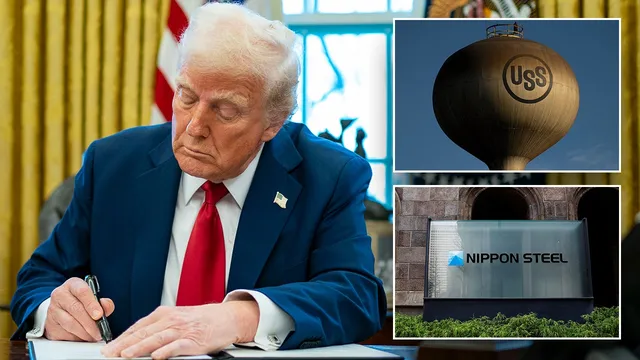
Trump approves Nippon Steel investment in U.S. Steel while keeping headquarters in Pittsburgh
2025-05-27 16:27- President Donald Trump announced a partnership that maintains U.S. Steel's headquarters in Pittsburgh.
- The deal involves a $14 billion investment from Japan's Nippon Steel and aims to create 70,000 new jobs.
- This strategic partnership shifts the narrative of foreign involvement in U.S. Steel away from ownership to investment.
Express your sentiment!
Insights
In a significant development for the American steel industry, President Donald Trump announced a partnership between U.S. Steel and Japan's Nippon Steel, marking a pivotal shift in the landscape of U.S. manufacturing. This partnership aims to keep U.S. Steel's headquarters in Pittsburgh, ensuring that American infrastructure remains strong amid economic challenges. During the announcement, Trump indicated that Nippon Steel would invest $14 billion over the next 14 months, which is expected to create at least 70,000 jobs and bolster the U.S. economy further. This arrangement comes after former President Joe Biden previously blocked Nippon's attempt to acquire U.S. Steel, citing national security concerns, which created uncertainty about the future of the company. Trump's approach contrasts sharply with Biden's decision, as he suggested this partnership would enhance American manufacturing rather than diminishing it through foreign ownership. Furthermore, Nippon’s investment entails a commitment to modernizing U.S. Steel's facilities, permitting the introduction of advanced steelmaking technologies that would maintain competitiveness in global markets. The administration's endorsement of this partnership arrives as a response to labor and economic pressures facing the steel industry, ensuring that not only will jobs be preserved, but thousands of new positions will be created in regions dependent on steel production. U.S. Steel has been a critical player in American manufacturing, and by forming this strategic partnership with Nippon, they hope to leverage new investments that can enhance efficiency, sustainability, and innovation across their operations. Despite concerns raised by the United Steelworkers union regarding foreign influence, proponents argue that this arrangement facilitates U.S. Steel's growth while protecting domestic interests. The partnership encapsulates a broader narrative surrounding American industry, reflecting ongoing debates about foreign investment, job preservation, and economic revitalization initiatives that resonate throughout Pennsylvania and beyond. As Trump prepares to hold a rally at the U.S. Steel headquarters soon to celebrate this agreement, it highlights his administration's continued commitment to supporting American manufacturing jobs, further engaging voters in the context of the 2024 presidential campaign. The recent developments signal a promising outlook for the American steel sector, focusing on infrastructure improvement, job creation, and the preservation of critical supply chains. The announcement represents a confluence of economic interests and nationalistic sentiments, as stakeholders seek to optimize the benefits of this partnership while simultaneously addressing concerns related to foreign ownership and its implications for American workers. In summary, the approval of this partnership is likely to have lasting impacts on U.S. manufacturing, shaping economic policies and labor dynamics for the foreseeable future, whilst potentially setting a precedent for how foreign investments are approached in industries deemed vital to national interests.
Contexts
Foreign investment plays a crucial role in shaping the landscape of the US steel industry, a sector that has undergone significant transformation over the past few decades. The influx of foreign capital has enabled steel companies to modernize facilities, adopt new technologies, and compete more effectively in both domestic and international markets. By providing the necessary financial resources, foreign investors have facilitated the refurbishment of aging plants and the establishment of cutting-edge manufacturing processes that can produce steel with lower emissions and greater efficiency. Such investments are critical as the US steel industry faces intense competition from low-cost producers around the globe, particularly in countries like China and India. One of the most significant impacts of foreign investment in the US steel industry is job creation and retention. While concerns about job losses due to automation and competition persist, foreign investment has often resulted in the stabilization and increase of employment in various regions. By enhancing the competitiveness of US steel manufacturers, foreign investment aids in securing jobs in both primary steel production and the supply chain, generating economic activity in local communities. Moreover, these investments often come with commitments to workforce training, which ensures that American workers are equipped with the necessary skills to thrive in an evolving industry. However, this influx of foreign investment is not without challenges and controversies. Domestic producers sometimes argue that foreign investments, especially from state-owned enterprises, can lead to unfair competition practices. These practices may include subsidization and dumping of steel in the US market, potentially harming local manufacturers. In response, policymakers have been scrutinizing foreign investments more closely and implementing tariffs and trade policies designed to protect the domestic steel industry. The balancing act between fostering beneficial foreign investment and protecting national interests poses a considerable challenge for regulators. Looking forward, the role of foreign investment in the US steel industry is likely to continue evolving, shaped by global economic trends, domestic policies, and the urgency of sustainable practices. As climate change concerns grow and the push for greener manufacturing intensifies, foreign investment could pivot towards financing environmentally friendly technologies in steel production. In this context, collaboration between foreign investors and domestic producers could drive innovation and environmental stewardship, ensuring that the US steel industry remains competitive and sustainable in the years to come. Ultimately, while foreign investments bring opportunities for growth and modernization, a careful approach is necessary to ensure that local interests and fair competition are upheld in a rapidly changing global market.